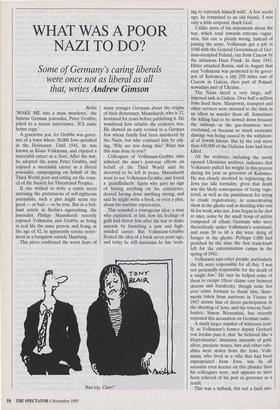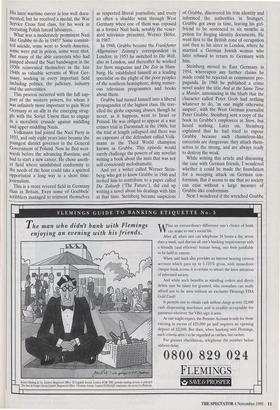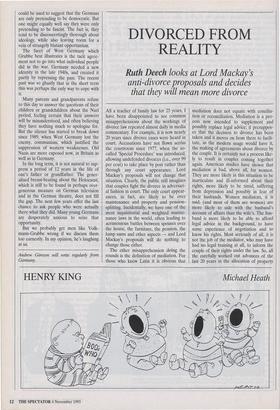WHAT WAS A POOR NAZI TO DO?
Some of Germany's caring liberals were once not as liberal as all
that, writes Andrew Gimson Berlin `MAKE ME into a mass murderer,' the famous German journalist, Peter Grubbe, joked to a recent interviewer. 'It'll make better copy.'
A gruesome jest, for Grubbe was gover- nor of a town whose 30,000 Jews perished in the Holocaust. Until 1945, he was known as Klaus Volkmann, and enjoyed a successful career as a Nazi. After the war, he adopted the name Peter Grubbe, and enjoyed a successful career as a liberal journalist, campaigning on behalf of the Third World poor and sitting on the coun- cil of the Society for Threatened Peoples.
If one wished to write a comic novel satirising the pretensions of self-righteous journalists, such a plot might seem too good — or bad — to be true. But in a bril- liant article in Berlin's tageszeitung, the journalist Philipp Mausshardt recently exposed Volkmann and Grubbe as being in real life the same person, and living, at the age of 82, in apparently serene retire- ment in a bungalow outside Hamburg.
This piece confirmed the worst fears of many younger Germans about the origins of their democracy. Mausshardt, who is 37, hesitated for years before publishing it. He wondered how reliable the evidence was. He showed an early version to a German Jew whose family had been murdered by the Nazis, but who confused him by ask- ing, 'Why are you doing this? What has this man done to you?'
Colleagues of Volkmann-Grubbe who admired the man's post-war efforts on behalf of the Third World said he deserved to be left in peace. Mausshardt went to see Volkmann-Grubbe, and found a 'grandfatherly' figure who gave no sign of having anything on his conscience, denied having done anything wrong, and said he might write a book, or even a play, about his wartime experiences.
This sounded a courageous idea: a man who explained, at last, how his feelings of guilt had driven him after the war to make amends by launching a new and high- minded career. But Volkmann-Grubbe floated the idea of a book seven years ago, and today he still maintains he has `noth- `Bad trip, Clare?' ing to reproach himself with'. A few weeks ago, he remarked to an old friend, 'I was only a little corporal, thank God.'
Unlike most of his statements about the war, which tend towards extreme vague- ness, this one is plainly wrong. Instead of joining the army, Volkmann got a job in 1940 with the General Government of Ger- man-occupied Poland, run from Cracow by the infamous Hans Frank. In June 1941, Hitler attacked Russia, and in August that year Volkmann was promoted to be gover- nor of Kolomea, a city 250 miles east of Cracow in Galicia, then part of Poland, nowadays part of Ukraine.
The Nazis faced a very large, self- imposed task in Galicia. Over half a million Jews lived there. Manpower, transport and other services were strained to the limit in an effort to murder them all. Sometimes the killing had to be slowed down because the railways or the gas-chambers were overtaxed, or because so much economic damage was being caused by the withdraw- al of Jewish labour. But by the end more than 430,000 of the Galician Jews had been killed.
All the evidence, including the newly opened Ukrainian archives, indicates that Volkmann pulled his weight in this process during his year as governor of Kolomea. He was closely involved in registering the Jews (no idle formality, given that death was the likely consequence of being regis- tered, as well as the punishment for trying to evade registration), in concentrating them in the ghetto and in deciding who was fit for work, who not. Jews began to be shot at once, some by the small troop of militia composed of ethnic Germans who were theoretically under Volkmann's command, and soon 50 to 60 a day were dying of hunger in the ghetto. Perhaps 5,000 had perished by the time the first train-loads left for the extermination camps in the spring of 1942.
Volkmann says other people, particularly the SS, were responsible for all this: 'I was not personally responsible for the death of a single Jew.' He says he helped some of them to escape (these claims vary between dozens and hundreds), though none has ever come forward to thank him. State- ments taken from survivors in Vienna in 1947 accuse him of direct participation in the shooting of Jews, and the veteran Nazi- hunter, Simon Wiesenthal, has recently repeated this accusation on German radio.
A much larger number of witnesses testi- fy, as Vol unann's former deputy Gerhard von Jordan puts it, that 'he behaved like a kleptomaniac'. Immense amounts of gold, silver, precious stones, furs and other valu- ables were stolen from the Jews. Volk- mann, who lived in a villa that had been expropriated from Jews, was by all accounts even keener on this plunder than his colleagues were, and appears to have been relieved of his post as governor as a result.
This was a setback, but not a fatal one. His later wartime career is less well docu- mented, but he received a medal, the War Service Cross first class, for his work in recruiting Polish forced labourers.
What was a moderately prominent Nazi like Grubbe to do in 1945? Some commit- ted suicide, some went to South America, some were put in prison, some were shot. But many of the able careerists who had Jumped aboard the Nazi bandwagon in the 1930s reinvented themselves in the late 1940s as valuable servants of West Ger- many, working in every important field including politics, the judiciary, industry and the universities.
This process occurred with the full sup- port of the western powers, . for whom it was infinitely more important to gain West Germany as an ally in the emerging strug- gle with the Soviet Union than to engage in a moralistic crusade against middling and upper-middling Nazis.
Volkmann had joined the Nazi Party in 1933, and only eight years later became the youngest district governor in the General Government of Poland. Now he fled west- wards before the advancing Russians, and had to start a new career. He chose anoth- er field where uninhibited conformity to the needs of the hour could take a spirited opportunist a long way in a short time: journalism.
This is a more revered field in Germany than in Britain. Even some of Goebbels' scribblers managed to reinvent themselves as respected liberal journalists, and every so often a shudder went through West Germany when one of them was exposed as a former Nazi hack, notably the vener- ated television presenter, Werner Hofer, in 1987.
In 1948, Grubbe became the Frankfurter Allgemeiner Zeitung's correspondent in London; in 1953 he switched to Die Welt, also in London, and thereafter he worked for Stern magazine and Die Zeit in Ham- burg. He established himself as a leading specialist on the plight of the poor peoples of the southern hemisphere, doing numer- ous television programmes and books about them.
Grubbe had turned himself into a liberal propagandist of the highest class. He trav- elled the globe exposing abuses, though he never, as it happens, went to Israel or Poland. He was obliged to appear at a war crimes trial in Darmstadt in the 1960s, but the trial at length collapsed and there was no exposure of the defendant called Volk- mann as the Third World champion known as Grubbe. This episode would surely challenge the powers of any novelist writing a book about the man that was not self-consciously melodramatic.
And yet a writer called Werner Stein- berg, who got to know Grubbe in 1946 and invited him to contribute to a paper called Die Zukunft (`The Future'), did end up writing a novel about his dealings with him at that time. Steinberg became suspicious of Grubbe, discovered his true identity and informed the authorities in Stuttgart. Grubbe got away in time, leaving his girl- friend to be sentenced to six months in prison for forging identity documents. He went first to the British zone of occupation and then to his sister in London, where he married a German Jewish woman who later refused to return to Germany with him.
Steinberg moved to East Germany in 1954, whereupon any further claims he made could be rejected as communist pro- paganda. In 1968 he published a crime novel under the title And at the Same Time a Murder, announcing in the blurb that the character called Peter Grob had nothing whatever to do, 'as one might otherwise suspect', with the West German journalist Peter Grubbe. Steinberg sent a copy of the book to Grubbe's employees at Stern, but heard nothing. Later on, Steinberg explained that he had tried to expose Grubbe because such chameleon-like careerists are dangerous: they attach them- selves to the strong, and are always ready to destroy the weak.
While writing this article and discussing the case with German friends, I wondered whether it could be made the foundation for a sweeping attack on German con- formism. But it seems to me that no society can exist without a large measure of Grubbe-like conformism.
Next I wondered if the wretched Grubbe could be used to suggest that the Germans are only pretending to be democratic. But one might equally well say they were only pretending to be fascist. The fact is, they tend to be disconcertingly thorough about ideology, while also leaving room for a vein of strangely blatant opportunism.
The facet of West Germany which Grubbe best illustrates is the tacit agree- ment not to go into what individual people did in the war. Germany needed a new identity in the late 1940s, and created it partly by repressing the past. The recent past was so ghastly that in the short term this was perhaps the only way to cope with it.
Many parents and grandparents refuse to this day to answer the questions of their children or grandchildren about the Nazi period, feeling certain that their answers will be misunderstood, and often believing they have nothing much to apologise for. But the silence has started to break down since 1989, when West Germany lost the enemy, communism, which justified the suppression of western weaknesses. Old Nazis are more exposed now, in Britain as well as in Germany.
In the long term, it is not natural to sup- press a period of 12 years in the life of one's father or grandfather. The gener- alised breast-beating about the Holocaust, which is still to be found in perhaps over- generous measure on German television and in the German theatre, does not fill the gap. The next few years offer the last chance to ask people who were actually there what they did. Many young Germans are desperately anxious to seize that opportunity.
But we probably get men like Volk- mann-Grubbe wrong if we discuss them too earnestly. In my opinion, he's laughing at us.
Andrew Gimson will write regularly from Germany.












































































 Previous page
Previous page